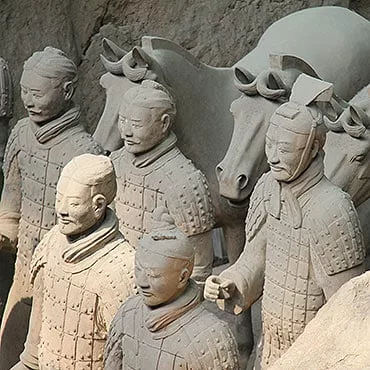
If you’re traveling in China early in the year, you’ll probably notice a buzz that seems to creep up out of nowhere. Typically composed and reserved as a people, you may even find a sense of anticipation and excitement permeating the air everywhere you visit in China.
Well, it’s no surprise. With Chinese New Year celebrations literally just around the corner – in 2020, it starts on 25 January – it’s all action stations as people make ready for this auspicious celebration.
Unlike New Year in Western culture, Chinese New Year is celebrated in an altogether different way. Rather than flutes of champagne, party poppers and countdowns till midnight, Chinese New Year is a tradition that sets it apart from other celebrations.
Want to know how to celebrate Chinese New Year? Let’s show you how it’s done.
Chinese New Year is all about tradition

If you’re going to celebrate Chinese New Year, you’d better prepare yourself for a tradition that some say goes back millennia.
It’s not entirely clear just when Chinese New Year first kicked off, however it’s believed to have come about during the Shang Dynasty, which ran from 1766 BC to 1122 BC. Like many Chinese traditions, this means it originated a long, long time ago.
There are others who believe Chinese New Year emerged even earlier, attributing the tradition to the time of Emperors Yao and Shun, around 2300 BC.
While historians may debate the origins, there’s little argument the Chinese New Year tradition, we have Emperor Wu of the Han Dynasty (206BC to 220BC) to thank for creating a set way to measure the lunar year, including establishing the first month of the traditional Chinese calendar as the start of the year.
If all this talk of dynasties and emperors is confusing you, don’t let it. If you want to celebrate Chinese New Year, just remember it occurs around a month after the Gregorian calendar’s New Year on the first day of the year. Think of it as a bonus celebration and opt in to the ways the Chinese commemorate this important annual event.
What happens at Chinese New Year?

Chinese New Year is not just any ordinary celebration. In fact, it’s the country’s most significant, which is no small feat considering there are a seriously large number in the Chinese calendar. Chinese people say Guo Nian (过年), which is literally translated as pass over Nian, but actually means to celebrate the Chinese New Year.
Chinese New Year is also called Spring Festival. Running over seven days, Chinese New Year is a public holiday throughout the whole country. If you’re traveling during this time, expect to find unusually quiet streets in otherwise busy cities. On the other hand, domestic travel to just about any destination in China can be a challenge.
People take advantage of the opportunity to slow down by visiting family and friends (often in some other part of the country). It’s a time of reunion and reconnection. Everyone tries to return to their hometown to reunite with parents and relatives.
Food is how you celebrate Chinese New Year

Food is such an integral part of Chinese life that it’s impossible to think of Chinese New Year without it.
First, there’s the essential big family dinner or Spring Festival Dinner – Nian Ye Fan (年夜饭) on New Year’s Eve. Considered a sumptuous affair, it’s a meal that finds every family going all out with meats, seafood, and of course, dumplings. Apart from being utterly delicious, having dumplings to celebrate Chinese New Year is significant. Shaped like an ancient Chinese gold ingot, making the dumplings together as a family means wrapping up wealth and prosperity, as well as living in happy union with family members.
But there’s more than dumplings to be enjoyed. China is a vast place and every region has its own food traditions to celebrate Chinese New Year.
While a northern Chinese family will prepare a feast around dumplings, a southern Chinese family will dine on sticky rice balls, or spring rolls as part of their banquet to celebrate the Chinese New Year. Like dumplings, the sticky rice balls are symbolic too. The spherical shape of the tang yuan signifies family reunion and happiness.
Fish (鱼Yu ) is also a staple main dish. Why? Because in Chinese, both the pronunciation of fish and its meaning are potent symbols. Meaning prosperous, fish or Nian Nian You Yu (年年有余) confers good wishes on the recipient, literally meaning Have savings every year. The Chinese are deeply poetic and it’s any wonder that Chinese New Year food is all “good luck” food.
What’s the color of Chinese New Year?

It’s probably no surprise to learn that red is the color of Chinese New Year, particularly given that it’s so much a part of that culture.
During this celebration, you will find it everywhere. Think of it as Christmas decorations, but all in one color – on everything.
You’ll find special Chinese lanterns, gifts, decorations, and clothes all in the color red. Why red?
Good question.
According to Chinese tradition, there was a mythical beast called “Year” or Nian (年), who had an uncanny resemblance to an ox with the head of a lion. Every New Year’s Eve, “Year” (Nian年) would emerge from the sea to wreak havoc on animals, people and property. Eventually, people realized that the color red, fire and loud sounds were deadly to Year. This led to the tradition of hanging red Dui Lian (Chinese New Year crafts) and red lanterns at the front of houses, as well as firecrackers and fireworks.
A big tip for celebrating Chinese New Year: Makes sure there’s some red involved.
What are common Chinese New Year traditions?

Other important customs to observe: Avoid speaking any negative words during the Chinese New Year period, especially on New Year’s Day. Don’t borrow money or collect debts on New Year’s Day. And another bonus, don’t finish cleaning all the dishes from your New Year’s Eve Dinner! We love that! Time to relax and enjoy all those dumplings you’ve prepared.
While Chinese New Year traditions have evolved over time, some practices have been retained. Now you will find local Chinese people going Spring Festival shopping for food, gifts, special decorations, and new clothes. Playing Mahjong at home with family and relatives is another typical celebratory activity.
And if that’s not enough to keep you happy, hang some red lanterns, decorate your doors with red Spring Festival couplets (poetry written in gold and black on red paper), paste paper-cuttings on the windows as decorations, and keep the lights on all night.
If you’re in the right location, you might even set off a few firecrackers. *Side note here: Many cities now have banned firecrackers and fireworks due to safety and air pollution concerns.
The festive mood is literally worn, with many people parading new clothes at Chinese New Year. Traditionally children are gifted red packets with money (now you can even do so via WeChat !), while paying a visit to neighbors, relatives, and even deceased family members are all part of how locals celebrate Chinese New Year.
Want to get out and about for Chinese New Year? You can do that too. It’s common for people to attend a Chinese New Year Temple Fair after setting off firecrackers in the morning.
Chinese New Year greetings
Now your Mandarin may not be what it could be, however there are a few expressions you can practice and use with confidence when you celebrate Chinese New Year.
First, Kung Hei Fat Choi is the standard Chinese New Year greeting, although it’s most often used on Spring Festival couplets found on doors. In mainland China, typically, people will say, “Happy New Year” or “Wishing you a happy Chinese New Year”.
If something like furniture or crockery accidentally breaks, it’s customary to say Sui Sui Ping An (岁岁平安“), which means May you have peace year after year or Luo Di Kai Hua, Fu Gui Rong Hua (落地开花, 富贵荣华“), essentially confers the best of good fortune, honor, glory and splendour on the recipient.
Wondering how to communicate best at Chinese New Year? While many people travel at this time, like Westerners, the Chinese rely on technology too, often making a New Year call via phone, WeChat, or a video call online. You can do the same, especially if you’re like modern Chinese people who’ll even take an overseas trip. As China has opened up to the world, some less traditional families are getting away from the Spring Festival travel rush, which occurs the 15 days ahead of, and 25 days after Chinese New Year. Incredibly, in 2019 alone, there were an estimated three billion trips made during this period.
Come prepared to celebrate Chinese New Year with your zodiac animal
Every year is a Chinese zodiac year with a different zodiac animal. In 2020, we’re celebrating the Year of the Rat.
There are 12 different animals in the Chinese zodiac and the Rat is the first of a repeating 12-year cycle.
This makes 2020 is a big deal. It’s regarded as a year of new beginnings and renewals and is considered a year that will be strong, prosperous and lucky for almost all Chinese zodiac signs.
So who are you in the Chinese Zodiac? Check out the table below to discover your animal.





 Great tour with Linda in Beijing
Great tour with Linda in Beijing





